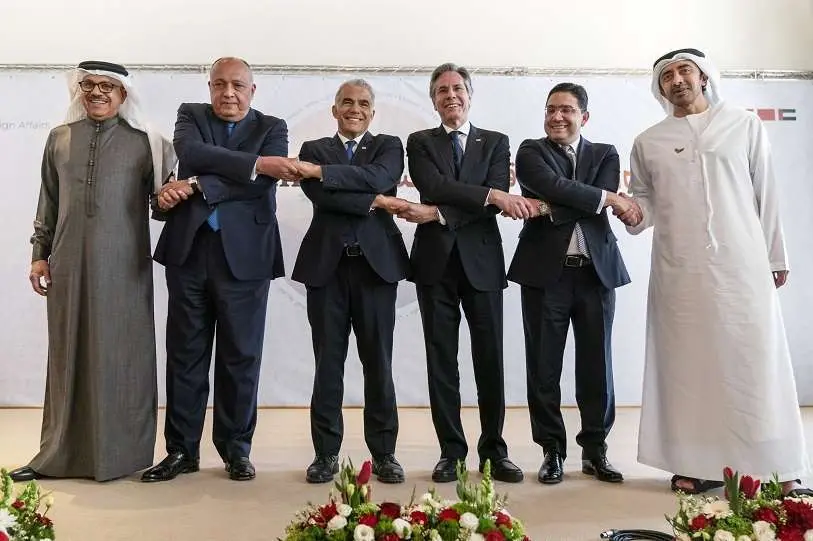Bourita califica la Cumbre del Néguev como “la mejor respuesta” frente al terrorismo

The historic Negev Summit has come to an end. A meeting that brought together, for the first time on Israeli soil, the foreign ministers of Bahrain, Abdulatif bin Rashid; Egypt, Sameh Shukri; Morocco, Nasser Bourita; and the United Arab Emirates, Abdullah bin Zayed al Nahyan, with their Hebrew counterpart, Yair Lapid, on Sunday 27 March and Monday 28 March.
The summit was also attended by US Secretary of State Antony Blinken, who joined the other Arab ministers at the symbolic Kibbutz Sde Boker in the Negev desert. It is an emblematic place for the Israeli people because of its importance in the building of the Hebrew state. The kibbutz ('collective farm') of Sde Boker is where the founder and former prime minister of Israel, David Ben Gurion, settled in the 1950s, during the arrival of the Jewish, socialist and Zionist movement fleeing Eastern Europe. And, to this day, he remains buried in that very kibbutz.

The event was clear evidence of diplomatic progress between the Hebrew state and the four Arab powers - which have already recognised and normalised their relations with Israel, through the signing of the 1979 peace treaty in the case of Egypt, and the adoption of the Abraham Accords in 2020 in the case of Bahrain, the United Arab Emirates and Morocco. "This new regional structure terrifies and deters our common enemies, first and foremost Iran and its proxies, who certainly have something to fear," Yair Lapid said at the final press conference, referring to one of the central themes of the summit: nuclear negotiations with Tehran.
However, Nasser Bourita's presence at the meeting brought other issues into the coalition, such as the Sahara, on which his Israeli counterpart expressed full support for Rabat's autonomous plan. In the same vein, the countries attending the meeting agreed to join forces to counteract "attempts to weaken Morocco's sovereignty and territorial integrity", as stated in a declaration issued by Lapid. These declarations referred to accusations of arms supplies and Iranian financing to groups such as the Houthis and the Polisario Front.

On a reciprocal basis, the Moroccan minister maintained that "a solution is possible" to the Israeli-Palestinian conflict, and underlined the support of the Kingdom of Morocco for the two-state project based on the 1967 territorial distribution, which also guarantees Israel's security. "Hopefully we will meet again soon in a different desert, but in the same spirit," said Nasser Bourita, who, in line with the other representatives, urged Tel Aviv to resume talks with Palestine.
However, as Yoel Guzansky, an analyst at the INSS research centre in Tel Aviv, told the AFP news agency, this summit has shown that "the Palestinian issue is not a priority for the Arab states, and that there are much more pressing issues, such as Iran". In Guzansky's words, the meeting materialised the Arab-Israeli alliance in the face of Tehran's 'dangers'.
That is why nuclear negotiations with the Islamic Republic, as well as their relations with the Persian country, were another of the main issues addressed. "We are all committed and determined to ensure that Iran never obtains nuclear weapons", said Antony Blinken at a press conference with Yair Lapid, in line with the concerns of Israel and its Arab neighbours. The new alliance fears that, with the imminent renegotiation of the deal and Arab rapprochement with Tel Aviv, the Islamic Republic's nuclear danger will increase rather than decrease.

Antony Blinken, despite Israel's stated position, has concluded that "the United States believes that returning to full implementation [of the agreement] is the best way to put Iran's nuclear programme back in the box it was in before it walked out the moment the United States left the agreement". Washington and Tehran are now in the final stages of indirect talks that would revive the 2015 deal, which would supposedly prevent Iran from acquiring nuclear weapons in exchange for the lifting of sanctions that have been punishing the Persian economy since 2018. However, the US representative has assured that the Islamic Revolutionary Guard (IRGC) will remain on the list of terrorist organisations, despite the fact that this was an Iranian condition in the negotiations on the nuclear deal.
"With or without an agreement, we will continue to work together and with our other partners to counter Iran's actions to destabilise the region," said Israeli Prime Minister Naftali Bennet.

Concluding a meeting that all participants described as "historic", the six representatives unanimously condemned terrorism. These statements were made in the context of the terrorist attack perpetrated by Daesh in the Israeli city of Hadera, in which two police officers were killed and more than half a dozen wounded. The four Arab countries, as well as Washington and Tel Aviv, agreed that the attack, rather than being a blow to the meeting's initiatives, made the meeting the first multilateral summit of its kind to be held on Israeli soil. A summit that symbolises the beginning of renewed efforts to build much more coordinated Arab-Israeli relations.
The holding of an Israeli-organised meeting with Arab countries "is the best response to these attacks", Nasser Bourita said in his speech.

The improvement in relations between Rabat and Tel Aviv is a reality that has already been evidenced by previous meetings, such as the one announced by the Israeli government days before the Negev Summit: "the head of the Strategic Planning and Cooperation Directorate, Tal Kelman, the head of the International Cooperation Division, Effie Defrin, and the head of the Operations Division of the Intelligence Directorate completed on Thursday the first official visit of the Israel Defense Forces to the Kingdom of Morocco", reported the AJN news agency.








